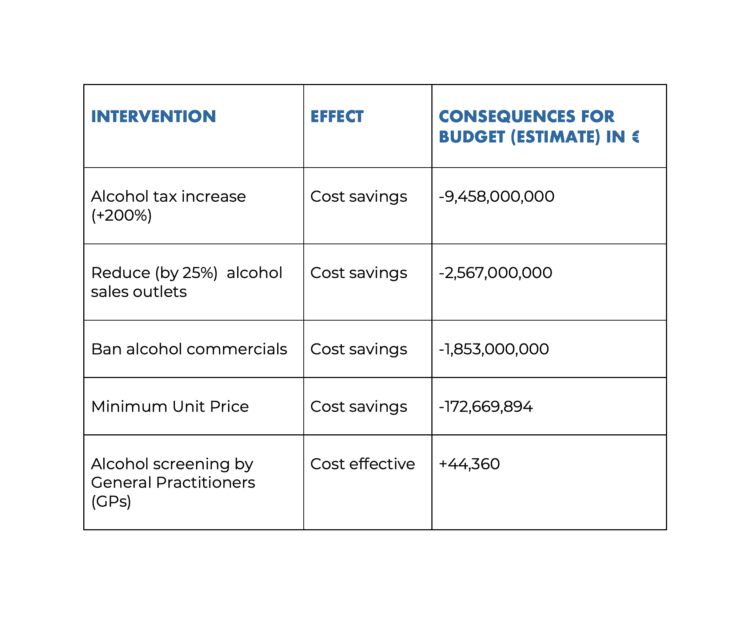Dutch Minister of Finance Wopke Hoekstra has sent 16 Broad Social Review reports to the House of Representatives. These advisory reports from top officials are prepared in advance of the next cabinet formation in 2021. The report on controlling healthcare costs lists 40 policy options and many preventive measures, including five alcohol policy measures (see table).
The “BMH 2 Towards a future-proof health care system” report provides insights into possible policy choices for the future of the Netherlands in the longer term.
Research shows that the Dutch consider health the most important thing for a good life. The Dutch are on average relatively healthy and have a higher life expectancy than most Europeans. But from an international perspective, expenditure on healthcare is above average and cost control of the collectively insured care requires permanent attention. Spending on long-term care and support is very high in the Netherlands, according to the report.
The accessibility, quality and affordability of the Dutch health care system are under pressure. The current organization of care is unsustainable in terms of both the occupation of the labor market and public finances,” states the report on controlling healthcare costs.
Healthcare expenditure is expected to continue to grow strongly in the Netherlands. It is expected to amount to 16.4% of GDP by 2040. If policy remains unchanged, health care expenditure will rise faster than economic growth in the coming years, displacing other government expenditure.
In this context, the costs of alcohol harm in the Netherlands and the potential impact of alcohol policy best buys solutions matter a great deal.
According to a news report from the Dutch Institute for Alcohol Policy (STAP) in 2019, total costs of alcohol amounted to €6.1 billion, in 2013. Much of this alcohol harm and related costs could be prevented. The social costs of alcohol harm alone amount to about €4.2 billion. Social costs are for instance the costs of reduced labor productivity and the costs of police, judiciary and traffic accidents.

Already in a 2019 report, the benefits of the alcohol policy best buys for government revenue and healthcare savings were illustrated:
- In the long run, over a period of 50 years, an increase in excise taxes of 50% would result in societal benefits of €4.5 to €10.7 billion,
- The societal benefits of reducing alcohol sales venues by 10% are estimated at €1.8 to €4.3 billion over 50 years.
- The societal benefits of a alcohol advertising ban would amount to €3.5 to €7.8 billion over 50 years, but this estimate comes with some uncertainty.
The alcohol prevention measures listed in the table above are measures that, according to the National Institute for Health and Environmental Hygiene, are proven cost-saving or cost-effective, with a limit of € 20,000 per quality-adjusted life year (QALY) gained. A negative amount in the table indicates savings; a positive amount costs.
These five alcohol policy measures include three alcohol policy best buys, as well as other scientifically proven interventions, that are part of the World Health Organization’s SAFER package, the blue-print for high-impact and evidence-based alcohol policy making.
Download
Direct link to the report.
WHO: New Technical Guide for Alcohol Policy
Source Website: STAP (The Dutch Institute for Alcohol Policy)
